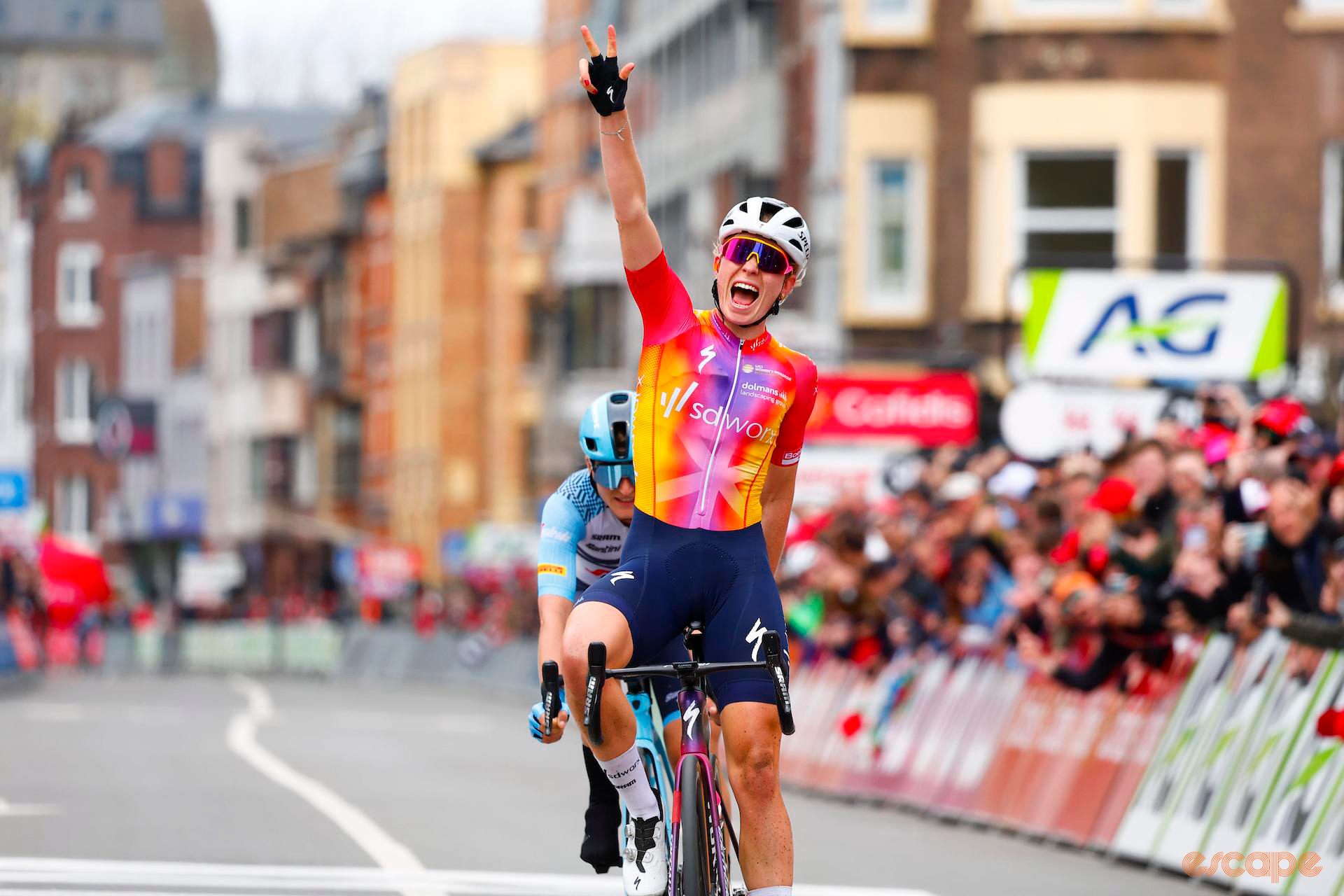Few things are certain in life, but one thing we can be sure of is that SD Worx will show up and take any race by the horns, no matter who ultimately gets the go-ahead as leader. At Liège-Bastogne-Liège the chosen one was, inevitably, Demi Vollering, just as she has been all through Ardennes Week.
It came down to a two-up sprint between the Dutch rider and a resurgent Elisa Longo Borghini (Trek-Segafredo), an apt culmination of a race that both teams attacked with a confidence deserving of their final standings.
Earlier in the day – the women had an alarmingly prompt start with breakfast scheduled as early as 0530 for SD Worx – it took a while for a group to form. In fact, it wasn’t until almost the halfway point that a dangerous five-rider group broke free and the peloton was allowed to settle for an hour or so before the crucial final climbs.
Marlen Reusser (SD Worx), Amanda Spratt (Trek-Segafredo), Esmée Peperkamp (DSM) and Anna Henderson (Jumbo Visma) took a lead of almost a minute onto La Redoute – Kasia Niewiadoma (Canyon-SRAM) had formed part of the move but a puncture forced her back into the peloton 15km before the iconic climb – and while the peloton maintained a steady pace behind, Reusser put her companions to the sword. The Swiss time trial specialist crested the punishing climb solo having dropped even climber Spratt on the steep upper slopes.
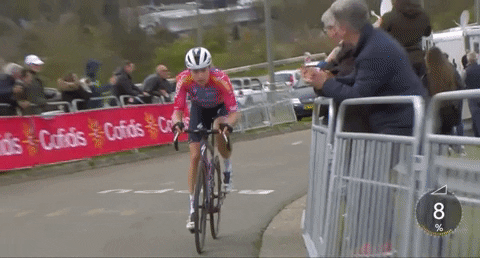
As the race dipped beneath 30km to go and the peloton continued to poke holes in one another rather than embark on a focused chase, Reusser’s gap edged dangerously towards two minutes. At this point though, Spratt was still wedged between the two competing parties – lone leader and chasing bunch – and only when the Australian was regained was Trek-Segafredo willing to put the hammer down, with Spratt’s help.
With just about 20km to go and over a minute to close, had they left it too late?
Trek-Segafredo was one of the best represented teams in the remaining bunch and they were able not only to trim the gap to Reusser but do it with such confidence and power that their rivals were put under serious pressure.
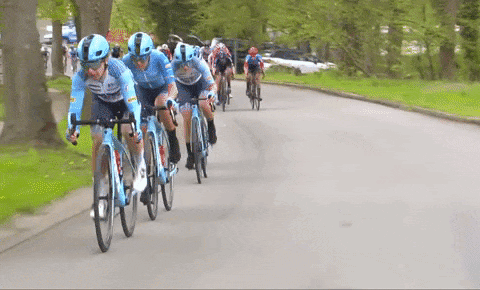
A fracture in the group ultimately led to the forming of a counter-attack comprising Elisa Longo Borghini and Gaia Realini (Trek-Segafredo), Elise Chabbey (Canyon-SRAM), Annemiek van Vleuten (Movistar) and standout favourite Vollering, this selection catching Reusser near the top of the Roche-aux-Faucons.
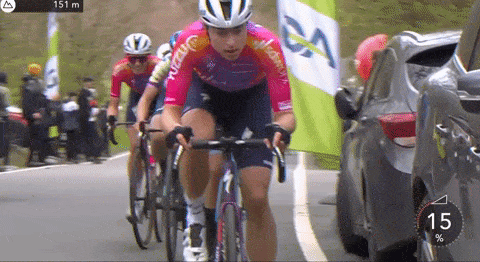
The SD Worx team tactics – tactical instincts – were not done yet, though. Reusser stayed on the front as the group began the fast descent, and when she pushed on, Longo Borghini was the only one to follow as Vollering pulled lightly on the brakes.
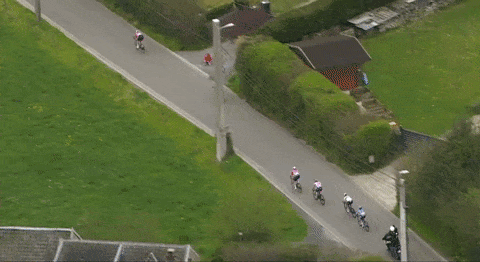
But it wasn’t long before Vollering herself leapt away from the chasers as the others looked around at one another, presumably too weary to respond after repeated accelerations.
With Reusser dropping back almost as soon as her teammate joined the front, Longo Borghini and Vollering worked well together as they plunged into the final 10 kilometres. The group behind was bolstered by Riejanne Markus (Jumbo-Visma), but with Reusser and Realini both sitting on, and Van Vleuten not looking quite on 2022 form, the duo was able to extend their lead to half a minute on the run-in.
That buffer was just as well, because when the pair ducked under the flamme rouge, both riders sat up and looked across at the other.
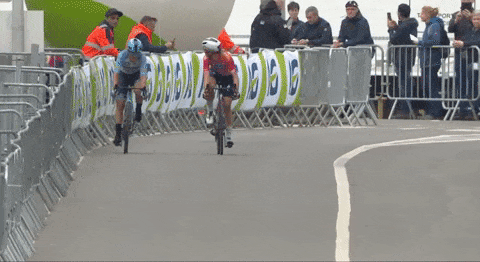
It was a game of chicken, who sprints first? Glances shot between them, and occasionally over the shoulder, as they raced at a steady pace down the finishing straight. Vollering managed to force the Italian onto the front, but it was far from full gas.
This lasted until the final 200 metres, when Longo Borghini blinked first and launched her sprint. Vollering was lightning fast in response and the SD Worx leader surged forward, crossing the line with enough of a gap to celebrate.
“I was really happy that Elisa wanted to work with me,” Vollering said. “In the last kilometre, I really needed to gamble, and I knew I could gamble because I had Marlen behind me, which made it a bit easier for me. But I’m just really happy that I could win the sprint.”
A clap of the hands and three fingers thrust skyward, the triple crown sealed. Vollering is only the second woman to win Amstel Gold, La Flèche Wallonne and Liège-Bastogne-Liège in the same season after her team DS and personal coach Anna van der Breggen achieved the feat in 2017.
“It’s not a chance you get every day, so I really wanted to take this home,” Vollering said of the Ardennes Triple. “Anna is not here today, unfortunately, but I’m sure she watched on TV and jumped around at home. She is also my coach, so I work really close together with her, and that’s really special.”
Longo Borghini’s second-place finish might seem bittersweet, but after an illness-marred early spring and up against a formidable SD Worx, this marks a good final bow in the Classics for Trek-Segafredo.
Following the finishing gamble from the leaders, the chase group came home 22 seconds later, with early attacker Reusser out-sprinting the group to make it an SD Worx-dominated podium – for the nth time this season.
What did you think of this story?
